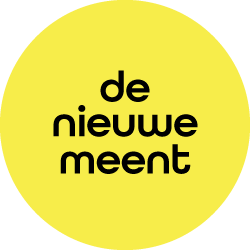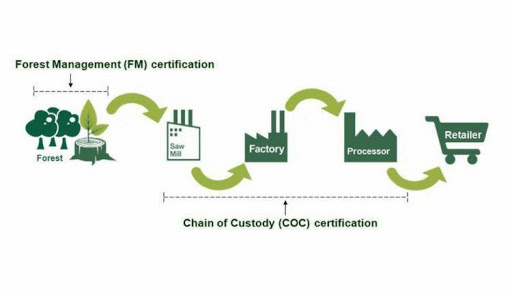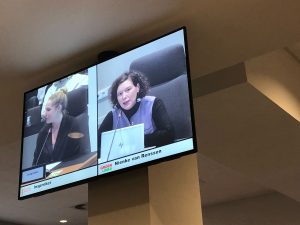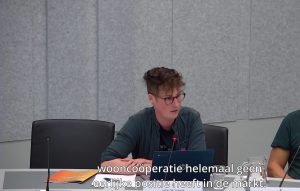We have been invited by FSC Netwerk to be one of the participants in the Nederlandse Duurzaam Bouwen Awards! FSC is the association responsible to give to wood the “FSC certification” that proves that wood is cultivated, harvested and processed in a responsible way towards nature and all the workers involved. The Award is assigned every year to the most sustainable Dutch building projects. Hereafter we share with you the questions we answered for the challenge. We’ll let you know if we will win the “golden frog”, fingers crossed!
How does your organization manifest itself as a ‘sustainable organisation’?
De Nieuwe Meent (dNM) is a pilot wooncoöperatie that is self developing 40 sustainable social housing units for rent in Amsterdam Oost. We have a broad understanding of sustainability that touch social, financial and environmental issues. Our goal is to create a multigenerational community based on four core values: Commoning, Care, Diversity and Sustainability.
The cooperative is organised as a democratic association composed by all future inhabitants. The coop, via a feasible business case, manages to take a mortgage. The coop members, paying rent, will repay the debts. In this way, via collective ownership, we give the possibility to citizens in the social housing sector to access financial credit and develop the house of their dreams.
How is this reflected in organizational philosophy and strategy, actual behavior and/or projects?
dNM places citizens at the center of the process to “make the city”. On one side gives them the possibility to self determine their living environment, on the other one they become active agents in changing the neighborhood, the city and even the real estate sector.
Housing is for living, not for profit!
When a community like ours is empowered and can be proactive in the housing market, it pushes the limits and restrictions usually determined by commercial developments (by private developers or housing corporations). Our building is designed to house community living, has a very low environmental impact, and very high quality standards.
To what extent has integrated sustainability (themes of energy, circularity, health) been implemented in this project?
dNM started to operate in late 2018, the construction of our future house will start at the end of 2021 and we will move in at the beginning of 2023.
We believe that community living and commoning is a great push to social and environmental sustainability. We create a safe space where people can happily grow old, raise children in an extended family or live a queer life. Inhabitants will support and care for each other in all stages of their life. People will leave compactly but will share a lot of communal spaces and resources like a large dining/living room, an event space, a guest room, a laundry and workshop space with tools.
The building is energy positive with a EPC = -0,17. We have a very efficient building envelope with a mindful orientation, we have a WKO system connected to heat pumps and floor heating/cooling, and we produce energy with solar panels.
dNM is circular. Our load bearing structure is made in CLT (cross laminated timber) and our facades in HSB (hout skelet bouw). The building is made with dry construction methods and therefore demountable. All components will be digitally catalogued (Madaster). We will use upcycled materials for cladding, finishes and furniture. We have a MPG = 0,45. How is your organization scalable (affordable and therefore repeatable)? (max. 120 words).
How is your organization scalable (affordable and therefore repeatable)?
In collaboration with the city and other institutional and private partners we setup an innovative business model that will expand the offer of the Dutch housing market. We have been one of the three pilots of the Actieplan Wooncooperatie of the city of Amsterdam. Our experience is replicable and we are already in touch with new groups of citizens that want to follow our path. Also (see question about innovation) in 25 years all our investment will be already paid back and we will start accumulating financial capital. Our statuten indicates that this capital will be used to develop more sustainable affordable housing. Growth of cooperative housing will be exponential.
Describe how entering into innovative collaboration (s) is reflected in your submission.
dNM is not an island but part of an archipelago of actors active in different fields. We are connected with several housing associations and platforms such as Soweto,, Vrjcoop, Platform 31, Cooplnk, WOON, with whom we share knowledge and open the way to new initiatives. We are part of the RVO program Wonen Zorg and we reserve some of our units to 55+ residents. We are in partnership with associations that work with refugees and asylum seekers, Here to Support, Protestants Dakonie, we reserved one unit for them and we will develop a workspace together. Integral part of our energy project are the energy coops Zuiderlicht and Meer Energie, together with them we are crowdfunding the energy production.
What makes your organization innovative? This concerns innovation in the field of technology and/or process approach and/or services.
We are a pilot project formed within the Action Plan Wooncoöperatie of the city of Amsterdam. We are reinventing the zelfbouw that was until now just reserved to owner occupied houses, extending it to the rental market and therefore expanding this opportunity to classes of society that do not have access to credit. The participative process and collective ownership empower citizens giving them the possibility to co-commissioning, co-designing, co-manage.
In ca. 25 years we will have all our debts repaid. From that point onward we will start to accumulate with rent, ca. 1M € every 3 years. With this money we will support new initiatives to make their wooncoöperatie. We are starting a revolution!
How is participation structured within your organization? This can be with (future) residents, tenants, users and other stakeholders.
dNM is officially a Vereniging, we are led by a Statuen that structures our governance around the coop core values and transparency. dNM members carry on the project by themselves on a voluntary basis. Of course we collaborate with a few professional advisers (with the professionals in the Bouwteam, with financial and legal advisers) and we collaborate with different institutions and with the city of Amsterdam. dNM are organized in 5 workgroups that work on specific themes (Community, Design, Finance, Legal, Media). The WG have the mandate to research and develop the discussion on specific topics, they present it in a general meeting that includes all members and where decisions are made based on consensus. Our meetings are open to the public and several non-members volunteers actively participate in the process.
How does your organization inspire others through active communication and positioning?
dNM wants to be a blue-print for future initiatives. Our public aim gives the possibility to join and learn from us in first person. We often present our project to public events not only in Amsterdam but nationally and internationally. We are in connection with several universities (UVA and UCA in Amsterdam, Copernicus in Utrecht, etc.) and we support students and teachers in their research. In the last 2 years dNM is a case study of courses and thesis.
We are extensively documenting our process. The results of this archiving process including also all our basic organizational docs and the building technical documentation is open source for all institutions and especially for future citizens groups that want to learn from us.



